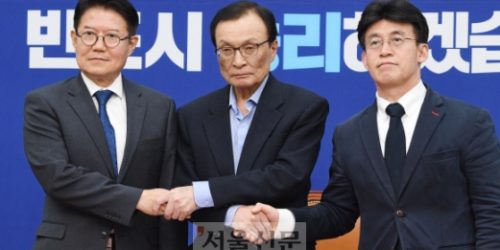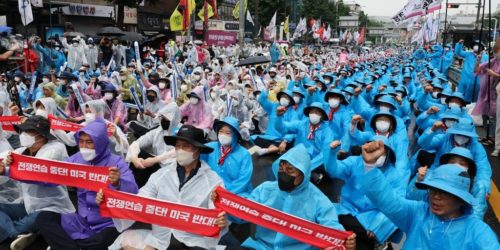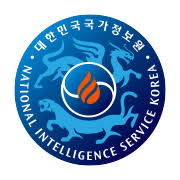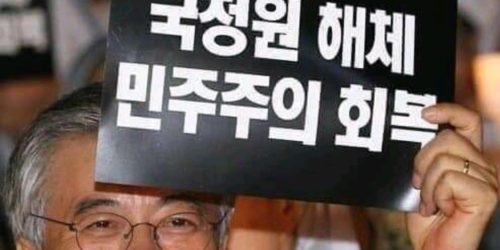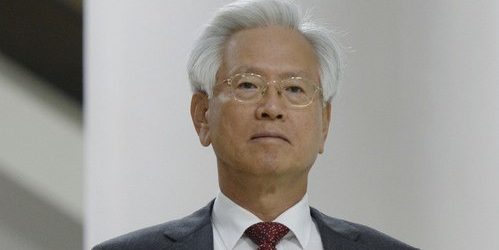South Korea Cannot Catch North Korean Spies Without Article 7 of the National Security Act
2020-12-16, PenNMike TV [Translation]
When the abolition of the National Security Act, a long-awaited project of the left, is completed, spy prosecution is impossible
(0:07) Anchor Choi Dae-hyun: Lawyer Koh Young-ju can be described as the premier expert on the National Security Act (국보법). He has worked a long time as the national security prosecutor…
(0:42) Choi: With the passage of Gongsoocheo Act [Corruption Investigation Office for High-ranking Officials (CIO), likened to North Korea’s Ministry of State Security, which targets high-ranking officials to ensure their loyalty], people are saying isn’t the abolition of the National Security Act next?
The Democratic Party is deleting Article 7 of the National Security Act. Article 7 punishes those who praise, encourage, propagandize, or sympathize with anti-state organization members or those who act upon receiving anti-state orders to a sentence of not more than 7 years in prison.
You have a background as a national security prosecutor and you have been saying (keeping) this law is absolutely necessary. Assemblyman Lee Kyu-min (이규민) (who introduced the bill to delete Article 7 of the National Security Act) claims that judges and prosecutors interpret the National Security Act any way they want. Is that true?
(0:55) Koh Young-ju: (Chuckles) How can they do that with the law? There have already been dozens of lawsuits about its constitutionality, and they have all been ruled constitutional. As a step toward abolishing the National Security Act, they are raising the issue of Article 7 first. There are already leftist organizations that are trying to abolish the National Security Act…
Article 7 is about the basic crime that is the foundation for all other crimes in the National Security Act. If Article 7 is deleted, then the opportunity to punish any other crimes described in the National Security Act disappears.
Let’s say that one is trying to catch a spy. If the spy encourages, praises, or sympathizes with North Korea, then an investigation can begin in order to expose the spy. If the article is deleted, then the basis to start an investigation goes away. In order to investigate North Korean agents’/spies’ infiltration/exfiltration, volunteering (to spy for North Korea), and meetings and communications (for spying activities), which are important in showing the violation of the National Security Act, there has to be a basis to begin an investigation (to discover those activities).
If Article 7 is deleted, no matter how much one praises, encourages, propagandizes, or sympathizes, that’s no longer a crime, so the authorities can’t undertake an investigation. Currently, (the Democratic Party) got rid of the NIS’s capability to catch spies, and the current government does not want the prosecutors or the police to pursue spy cases, so in reality, the National Security Act has already weakened significantly. By getting rid of Article 7, they are getting rid of the will–whatever is left–to catch spies.
(4.27) Choi: I see. So they are saying just give up on catching North Korean spies.
(4:29) Koh: Yes, it means don’t investigate any anti-state offenders. It doesn’t make sense that the application of the law varies depending on the disposition of the judge or prosecutor, because the clause “despite knowing it is dangerous to the existence of the state or the basic order of liberal democracy.” [Note: “Knowing” is italicized for emphasis. In the U.S., the criminal intent element for treason normally are “general intent” and “knowingly” committing an act.]
So it’s not a crime for those who don’t know what they say is dangerous to the existence of the state or the basic order of liberal democracy. So it applies only to those who say it with malicious intent. Also, there have been accumulated precedents, so there really is no room for the judges and prosecutors to interpret it any way they want.
(5:26) Choi: So it’s the opposite (harder to deviate) because of accumulated precedents.
(5:27) Koh: Absolutely. Meanings are specified, so there is no room for arbitrary ruling. They’re just making up excuses in order to abolish the National Security Act.
(5:44) Choi: According to Assemblyman Lee’s claims, there are ample opportunities to catch spies just with the regular criminal law.
(5:53) Koh: That’s the most important deception. Without the National Security Act, there is no other way to catch North Korean agents/spies. It’s because our Constitution does not recognize North Korea as a country. It says “The territory of the Republic of Korea shall consist of the Korean peninsula and its adjacent island.” So North Korea is part of our territory and the one with sovereignty is the Republic of Korea, by our constitution. Thus, North Korea is not a “state.” It’s also not a “foreign country.” And it’s not an “enemy state.” To be an “enemy state,” it must be a “state” first…
The spy crime is detailed in our country’s Criminal Law Section 98, but it states “those who spy for “enemy states” are punishable by death, life sentence, etc. So the spying has to be done for an “enemy state,” but North Korea is not an “enemy state”…
We apply a strict guideline of the principle of nulla poena sine lege (principle of legality; 죄형법정주의), so we can’t prosecute North Korean spies with the criminal law…
In North Korea’s criminal law, it also says punish those who spied for an “enemy state.” North Korea punishes using its criminal law, without (a separate) National Security Law. So those (in South Korea) who think that it’s possible to prosecute North Korean agents/spies are thinking of North Korea’s situation. A feature of North Korea’s criminal law is that they don’t acknowledge the principle of nulla poena sine lege at all…The concept of nulla poena sine lege doesn’t exist. So they permit the use of analogical interpretation in general.
North Korea also says South Korea is not a state, but for those who spied for the Republic of Korea, (North Korea’s law) states that they prosecute using the most similarly themed criminal code. Despite North Korea also saying the Republic of Korea is an anti-state organization, they deem “anti-state organization” and “enemy state” as similar…it says to punish as if the spy is from an enemy state. But in our country, the principle of nulla poena sine lege is so strictly applied, and since North Korea is not an “enemy state,” we can’t prosecute using our criminal law…
(9:05) Choi: Yes, while North Korea can be a “main enemy,” it is not a “state,” so we cannot apply the “enemy state” (criminal law).
(9:07) Koh: Prior to 1958, there have been situations in which we applied the criminal law, saying North Korean spies ultimately were for an “enemy state” of the Chinese Communists. Now, however, we can’t view China as an “enemy state.” During the Korean War period, China was an “enemy state.”
(9:38) Choi: In that case, if the Chinese Communists sent spies, then wouldn’t it be difficult to prosecute them without the National Security Law?
(9:42) Koh: In that situation, the National Security Act doesn’t matter. Even with the National Security Act, we can’t punish Chinese spies. In other countries, they are able to prosecute foreign spies, but our criminal law only applies to “enemy state” spies. But we can’t call China an “enemy state” now, although in reality, it has that aptitude. So with the current criminal law, we can’t prosecute Chinese spies or Japanese spies or Russian spies or any spies.
(10:17) Choi: We then need to strengthen the law, rather than weaken it.
(10:18) Koh: Yes, we need to strengthen (the law).
(10:23) Koh: At least we have the National Security Law to deal with North Korean spies, which makes prosecution possible, but now we are in a situation in which we can’t prosecute even the agents/spies for North Korea…
(10:44) Choi: Assemblyman Lee Kyu-min also claims that (the National Security Act) is against the constitution by violating individual ideology and the freedom of conscience. What do you think about that?
(10:53) Koh: Regarding the freedom of individual ideology and conscience, an individual thinking them is a definite right. But as I mentioned earlier, if they know that it is dangerous to the existence of the state and the basic order of liberal democracy, but still praise, encourage, or sympathize with an anti-state organization or propagandize its assertions–that cannot be overlooked, because of the principle of defending democracy (방어적 민주주의 원리). Although our free democratic system is open and permissive, the law is such that we cannot overlook the acts to harm the liberal democracy itself. That is called “the principle of defending democracy.”
(11:42) Choi: I think the public really needs to know this.
(11:52) Koh: What the public must know is that without the National Security Law, based on our legal system, it is not possible to prosecute those spying for North Korea. Is it OK not to prosecute North Korean spies? That’s the question we need to ask the public.
Source: https://www.youtube.com/watch?v=iLYAEfTaDHo&feature=youtu.be

